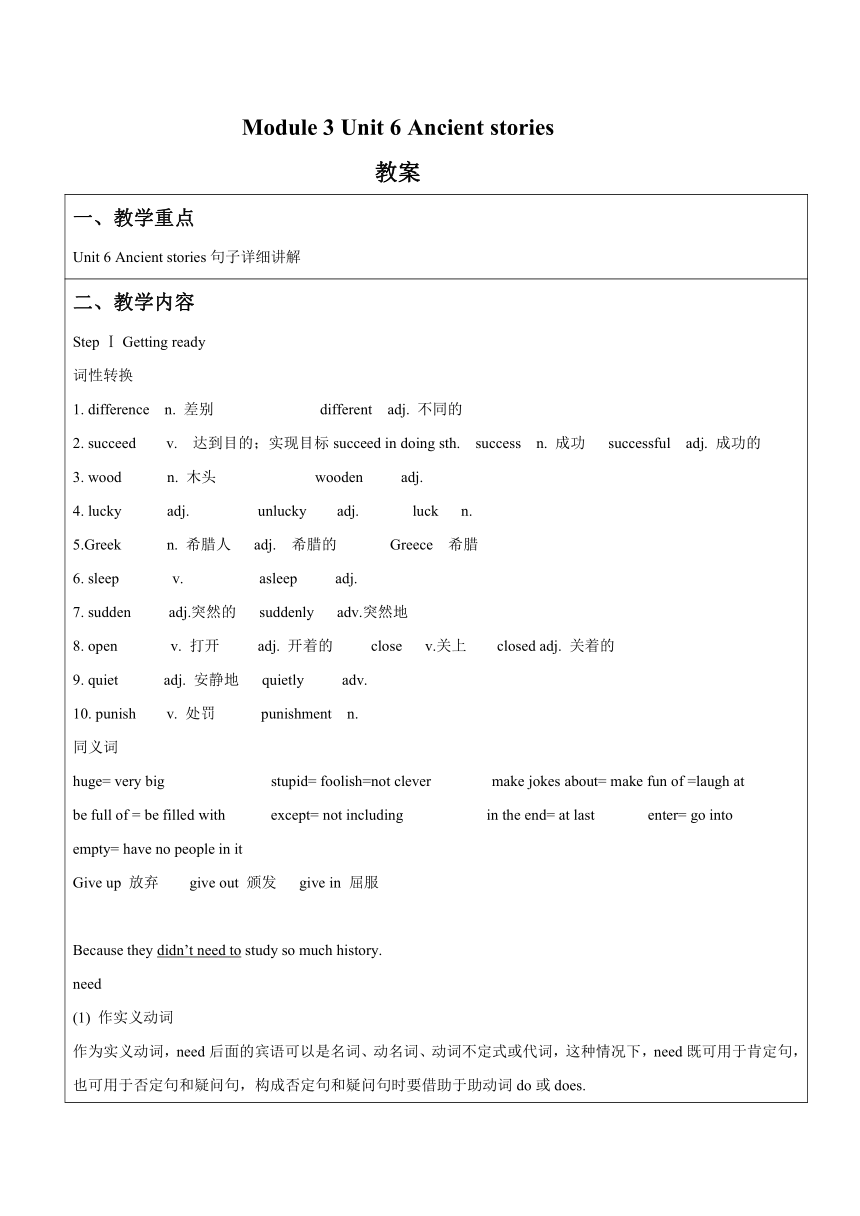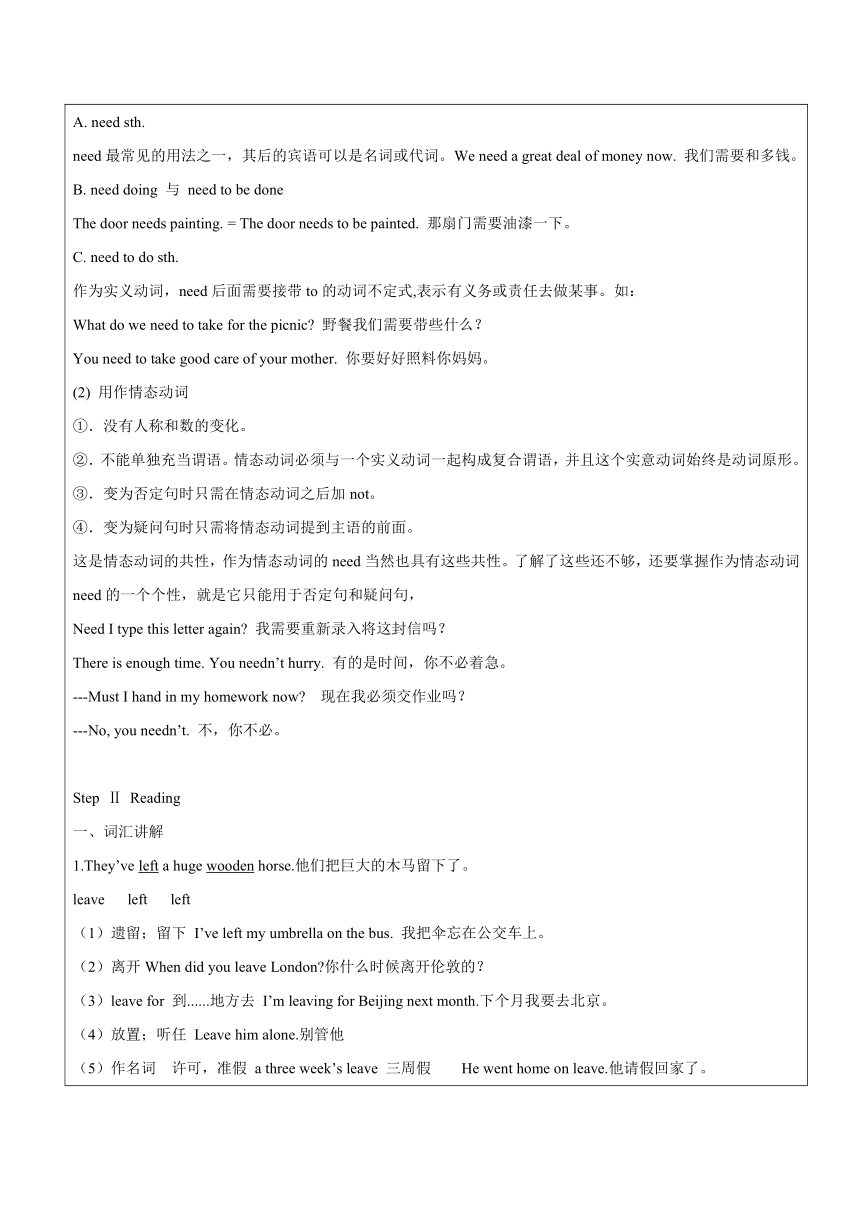广东省深圳市Module 3 Unit 6 Ancient stories 教案
文档属性
| 名称 | 广东省深圳市Module 3 Unit 6 Ancient stories 教案 |  | |
| 格式 | zip | ||
| 文件大小 | 121.4KB | ||
| 资源类型 | 教案 | ||
| 版本资源 | 牛津深圳版 | ||
| 科目 | 英语 | ||
| 更新时间 | 2017-08-09 18:03:40 | ||
图片预览


文档简介
Module
3
Unit
6
Ancient
stories
教案
一、教学重点Unit
6
Ancient
stories句子详细讲解
二、教学内容Step
Ⅰ
Getting
ready词性转换1.
difference
n.
差别
different
adj.
不同的2.
succeed
v.
达到目的;实现目标succeed
in
doing
sth.
success
n.
成功
successful
adj.
成功的3.
wood
n.
木头
wooden
adj.4.
lucky
adj.
unlucky
adj.
luck
n.
5.Greek
n.
希腊人
adj.
希腊的
Greece
希腊6.
sleep
v.
asleep
adj.
7.
sudden
adj.突然的
suddenly
adv.突然地8.
open
v.
打开
adj.
开着的
close
v.关上
closed
adj.
关着的9.
quiet
adj.
安静地
quietly
adv.10.
punish
v.
处罚
punishment
n.同义词huge=
very
big
stupid=
foolish=not
clever
make
jokes
about=
make
fun
of
=laugh
at
be
full
of
=
be
filled
with
except=
not
including
in
the
end=
at
last
enter=
go
intoempty=
have
no
people
in
it
Give
up
放弃
give
out
颁发
give
in
屈服Because
they
didn’t
need
to
study
so
much
history.need
作实义动词作为实义动词,need后面的宾语可以是名词、动名词、动词不定式或代词,这种情况下,need既可用于肯定句,也可用于否定句和疑问句,构成否定句和疑问句时要借助于助动词do或does.A.
need
sth.need最常见的用法之一,其后的宾语可以是名词或代词。We
need
a
great
deal
of
money
now.
我们需要和多钱。B.
need
doing
与
need
to
be
doneThe
door
needs
painting.
=
The
door
needs
to
be
painted.
那扇门需要油漆一下。C.
need
to
do
sth.作为实义动词,need后面需要接带to的动词不定式,表示有义务或责任去做某事。如:What
do
we
need
to
take
for
the
picnic
野餐我们需要带些什么?You
need
to
take
good
care
of
your
mother.
你要好好照料你妈妈。(2)
用作情态动词①.没有人称和数的变化。②.不能单独充当谓语。情态动词必须与一个实义动词一起构成复合谓语,并且这个实意动词始终是动词原形。③.变为否定句时只需在情态动词之后加not。④.变为疑问句时只需将情态动词提到主语的前面。这是情态动词的共性,作为情态动词的need当然也具有这些共性。了解了这些还不够,还要掌握作为情态动词need的一个个性,就是它只能用于否定句和疑问句,Need
I
type
this
letter
again
我需要重新录入将这封信吗?There
is
enough
time.
You
needn’t
hurry.
有的是时间,你不必着急。---Must
I
hand
in
my
homework
now
现在我必须交作业吗?---No,
you
needn’t.
不,你不必。Step
Ⅱ
Reading词汇讲解They’ve
left
a
huge
wooden
horse.他们把巨大的木马留下了。leave
left
left遗留;留下
I’ve
left
my
umbrella
on
the
bus.
我把伞忘在公交车上。离开When
did
you
leave
London 你什么时候离开伦敦的?leave
for
到......地方去
I’m
leaving
for
Beijing
next
month.下个月我要去北京。放置;听任
Leave
him
alone.别管他作名词
许可,准假
a
three
week’s
leave
三周假
He
went
home
on
leave.他请假回家了。They
sang
and
danced
around
the
horse,
and
made
jokes
about
the
stupid
Greeks.他们围着木马唱歌、跳舞,取笑愚蠢的希腊人。(1)jokemake
jokes
about
拿......开玩笑
You
shouldn’t
make
jokes
about
the
poor
girl.have
a
joke
with
sb.与某人一起说笑话play
a
joke
on
sb.
戏弄某人=make
fun
of=
laugh
attell
jokes
讲笑话
(2)Greek
n
希腊人
adj.
希腊的
Greece
希腊
I
haven’t
laughed
like
this
since
my
childhood.(1)since+时间点=
for+一段时间e.g.
He
has
lived
in
Shenzhen
since
2010.=He
has
lived
in
Shenzhen
for
3
years.(2)Childhood
童年
child
孩子
children
复数They
locked
all
the
gates
of
the
city
and
then
all
went
to
sleep.(1)go
to
sleep=
go
to
bed(2)fall
asleep
(3)sleepy
欲睡的
困乏的She
was
still
tired
and
sleepy
when
he
woke
her.他叫醒她的时候,她仍然又累又困。By
midnight,
the
main
square
was
empty,
except
for
the
huge
horse.到半夜的时候,除了那匹巨大的木马,广场上空无一人by
介词
当(某时候)到了,到(某时)之前,不晚于e.g.
They
were
tired
out
by
evening.到晚上时,他们疲倦极了。
by
通过+V-inge.g.
Match
them
with
the
correct
countries
by
writing
the
letters
in
the
brackets.except
for
除.......之外,只是e.g.
The
room
is
tidy
except
for
the
carpet.除地毯外,房间很干净【辨析】except;
except
for;
besidesExcept
“除......之外”表示“例外、排除”,表示排除的是同类事物或行为。e.g.
He
gets
up
early
every
day
except
Sunday.除了星期天外,他每天都早起。Except
for
“除......之外”,它后面的宾语一般为句子里所涉及的内容并非同类事物或行为e.g.
The
story
is
well
written
except
for
a
few
spelling
mistakes.除了几个拼写错误外,这个故事写得很好Besides“除......之外还有”=in
addition
e.g.
We
all
went
swimming
besides
him.除了他以外,我们也都去游泳了。6.
The
horse
was
full
of
Greek
soldiers!
They
quietly
climbed
out
of
the
horse
one
by
one.be
full
of=
be
filled
withe.g.
The
glass
is
filled
with
milk.=
The
glass
is
full
of
milk.one
by
one
一个接着一个
step
by
step一步步..7.
In
one
night,
they
succeeded
in
capturing
it
through
a
clever
trick.在一夜之内,他们靠一个计谋成功地夺取了它。
(1)succeed
in
doing
sth.
=
do
sth.
successfully成功地做了某事
(2)success
不可数名词
“成功
成就”
e.g.
Both
plans
have
been
tried
without
success.两个计划都已试过,但未获成功
可数名词“成功的人或事”
e.g.
The
plan
was
a
great
success.这项计划极为成功。
(3)successful
adj.
成功的a
successful
teacher
一个成功的老师
3
Unit
6
Ancient
stories
教案
一、教学重点Unit
6
Ancient
stories句子详细讲解
二、教学内容Step
Ⅰ
Getting
ready词性转换1.
difference
n.
差别
different
adj.
不同的2.
succeed
v.
达到目的;实现目标succeed
in
doing
sth.
success
n.
成功
successful
adj.
成功的3.
wood
n.
木头
wooden
adj.4.
lucky
adj.
unlucky
adj.
luck
n.
5.Greek
n.
希腊人
adj.
希腊的
Greece
希腊6.
sleep
v.
asleep
adj.
7.
sudden
adj.突然的
suddenly
adv.突然地8.
open
v.
打开
adj.
开着的
close
v.关上
closed
adj.
关着的9.
quiet
adj.
安静地
quietly
adv.10.
punish
v.
处罚
punishment
n.同义词huge=
very
big
stupid=
foolish=not
clever
make
jokes
about=
make
fun
of
=laugh
at
be
full
of
=
be
filled
with
except=
not
including
in
the
end=
at
last
enter=
go
intoempty=
have
no
people
in
it
Give
up
放弃
give
out
颁发
give
in
屈服Because
they
didn’t
need
to
study
so
much
history.need
作实义动词作为实义动词,need后面的宾语可以是名词、动名词、动词不定式或代词,这种情况下,need既可用于肯定句,也可用于否定句和疑问句,构成否定句和疑问句时要借助于助动词do或does.A.
need
sth.need最常见的用法之一,其后的宾语可以是名词或代词。We
need
a
great
deal
of
money
now.
我们需要和多钱。B.
need
doing
与
need
to
be
doneThe
door
needs
painting.
=
The
door
needs
to
be
painted.
那扇门需要油漆一下。C.
need
to
do
sth.作为实义动词,need后面需要接带to的动词不定式,表示有义务或责任去做某事。如:What
do
we
need
to
take
for
the
picnic
野餐我们需要带些什么?You
need
to
take
good
care
of
your
mother.
你要好好照料你妈妈。(2)
用作情态动词①.没有人称和数的变化。②.不能单独充当谓语。情态动词必须与一个实义动词一起构成复合谓语,并且这个实意动词始终是动词原形。③.变为否定句时只需在情态动词之后加not。④.变为疑问句时只需将情态动词提到主语的前面。这是情态动词的共性,作为情态动词的need当然也具有这些共性。了解了这些还不够,还要掌握作为情态动词need的一个个性,就是它只能用于否定句和疑问句,Need
I
type
this
letter
again
我需要重新录入将这封信吗?There
is
enough
time.
You
needn’t
hurry.
有的是时间,你不必着急。---Must
I
hand
in
my
homework
now
现在我必须交作业吗?---No,
you
needn’t.
不,你不必。Step
Ⅱ
Reading词汇讲解They’ve
left
a
huge
wooden
horse.他们把巨大的木马留下了。leave
left
left遗留;留下
I’ve
left
my
umbrella
on
the
bus.
我把伞忘在公交车上。离开When
did
you
leave
London 你什么时候离开伦敦的?leave
for
到......地方去
I’m
leaving
for
Beijing
next
month.下个月我要去北京。放置;听任
Leave
him
alone.别管他作名词
许可,准假
a
three
week’s
leave
三周假
He
went
home
on
leave.他请假回家了。They
sang
and
danced
around
the
horse,
and
made
jokes
about
the
stupid
Greeks.他们围着木马唱歌、跳舞,取笑愚蠢的希腊人。(1)jokemake
jokes
about
拿......开玩笑
You
shouldn’t
make
jokes
about
the
poor
girl.have
a
joke
with
sb.与某人一起说笑话play
a
joke
on
sb.
戏弄某人=make
fun
of=
laugh
attell
jokes
讲笑话
(2)Greek
n
希腊人
adj.
希腊的
Greece
希腊
I
haven’t
laughed
like
this
since
my
childhood.(1)since+时间点=
for+一段时间e.g.
He
has
lived
in
Shenzhen
since
2010.=He
has
lived
in
Shenzhen
for
3
years.(2)Childhood
童年
child
孩子
children
复数They
locked
all
the
gates
of
the
city
and
then
all
went
to
sleep.(1)go
to
sleep=
go
to
bed(2)fall
asleep
(3)sleepy
欲睡的
困乏的She
was
still
tired
and
sleepy
when
he
woke
her.他叫醒她的时候,她仍然又累又困。By
midnight,
the
main
square
was
empty,
except
for
the
huge
horse.到半夜的时候,除了那匹巨大的木马,广场上空无一人by
介词
当(某时候)到了,到(某时)之前,不晚于e.g.
They
were
tired
out
by
evening.到晚上时,他们疲倦极了。
by
通过+V-inge.g.
Match
them
with
the
correct
countries
by
writing
the
letters
in
the
brackets.except
for
除.......之外,只是e.g.
The
room
is
tidy
except
for
the
carpet.除地毯外,房间很干净【辨析】except;
except
for;
besidesExcept
“除......之外”表示“例外、排除”,表示排除的是同类事物或行为。e.g.
He
gets
up
early
every
day
except
Sunday.除了星期天外,他每天都早起。Except
for
“除......之外”,它后面的宾语一般为句子里所涉及的内容并非同类事物或行为e.g.
The
story
is
well
written
except
for
a
few
spelling
mistakes.除了几个拼写错误外,这个故事写得很好Besides“除......之外还有”=in
addition
e.g.
We
all
went
swimming
besides
him.除了他以外,我们也都去游泳了。6.
The
horse
was
full
of
Greek
soldiers!
They
quietly
climbed
out
of
the
horse
one
by
one.be
full
of=
be
filled
withe.g.
The
glass
is
filled
with
milk.=
The
glass
is
full
of
milk.one
by
one
一个接着一个
step
by
step一步步..7.
In
one
night,
they
succeeded
in
capturing
it
through
a
clever
trick.在一夜之内,他们靠一个计谋成功地夺取了它。
(1)succeed
in
doing
sth.
=
do
sth.
successfully成功地做了某事
(2)success
不可数名词
“成功
成就”
e.g.
Both
plans
have
been
tried
without
success.两个计划都已试过,但未获成功
可数名词“成功的人或事”
e.g.
The
plan
was
a
great
success.这项计划极为成功。
(3)successful
adj.
成功的a
successful
teacher
一个成功的老师
